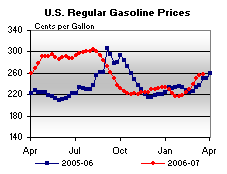Let me now turn to the inflation situation. Overall consumer price inflation has come down since last year, primarily as a result of the deceleration of consumers� energy costs. The consumer price index (CPI) increased 2.4 percent over the twelve months ending in February, down from 3.6 percent a year earlier. Core inflation slowed modestly in the second half of last year, but recent readings have been somewhat elevated and the level of core inflation remains uncomfortably high. For example, core CPI inflation over the twelve months ending in February was 2.7 percent, up from 2.1 percent a year earlier. Another measure of core inflation that we monitor closely, based on the price index for personal consumption expenditures excluding food and energy, shows a similar pattern.
Translation: Inflation came down for awhile. But it's increased over the last few months, and we don't like that too much. It makes our job a whole lot harder.
Core inflation, which is a better measure of the underlying inflation trend than overall inflation, seems likely to moderate gradually over time. Despite recent increases in the price of crude oil, energy prices are below last year�s peak. If energy prices remain near current levels, greater stability in the costs of producing non-energy goods and services will reduce pressure on core inflation over time. Of course, the prices of oil and other commodities are very difficult to predict, and they remain a source of considerable uncertainty in the inflation outlook.
Translation: We've been saying inflation would moderate for awhile and it hasn't.
Also -- Ben might want to take a look at this chart of gas prices, which indicates they're higher now than this time last year.

I also think it's interesting he did not mention anything about agricultural prices, which have been increasing for the last few years and have started to increase over the last 3 months in the PPI and CPI report.
Although core inflation seems likely to moderate gradually over time, the risks to this forecast are to the upside. In particular, upward pressure on inflation could materialize if final demand were to exceed the underlying productive capacity of the economy for a sustained period. The rate of resource utilization is high, as can be seen most clearly in the tightness of the labor market. Indeed, anecdotal reports suggest that businesses are having difficulty recruiting well-qualified workers in a range of occupations. Measures of labor compensation, though still growing at a moderate pace, have shown some signs of acceleration over the past year, likely in part the result of tight labor market conditions.
Translation: We still think inflation is more likely to increase than decrease. So much for my statement at the beginning that "we expect inflation pressures to moderate".
Short version: The Fed is still focused on raising rates if inflation increases.